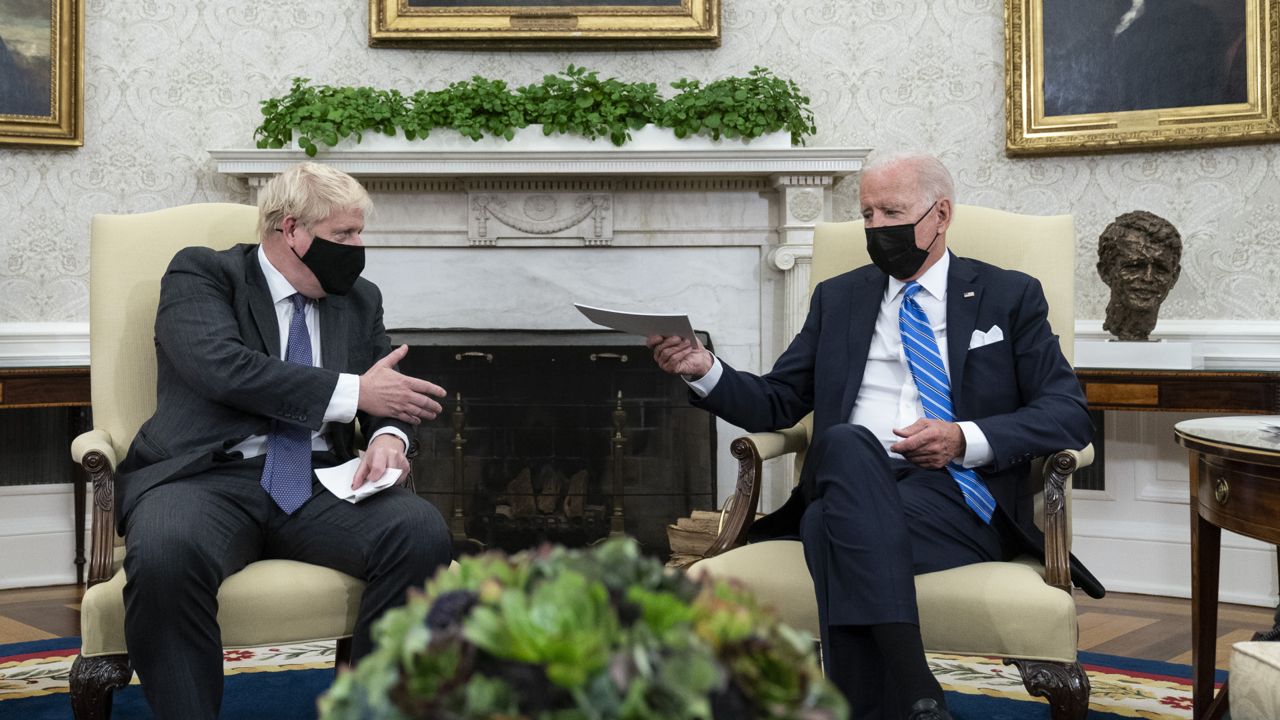President Joe Biden and British Prime Minister Boris Johnson previewed a new era of U.S.-U.K. relations on Tuesday, both agreeing that addressing climate change will be one of the preemptive challenges facing the world in the years to come — and that their two nations will have to lead the way.
Both leaders spent the first part of their day at the United Nations General Assembly in New York, where Biden largely focused on America’s increased commitment to green programs under his administration.
“I made clear the climate has to be the core area of action for all of us,” Biden said ahead of a closed-door meeting at the White House.
Biden also praised Johnson for traveling from New York to Washington via Amtrak, President Biden’s historically preferred method of travel.
"You are a living deity" on Amtrak, Johnson said to Biden in the White House. "They love you."
"If I were a conductor, I'd be No. 1 in seniority," Biden joked of how much time he has spent communting on Amtrak.
Biden used his time at the U.N. to call on the world’s nations to forcefully address the festering global issues of the COVID-19 pandemic, climate change and human rights abuses, also making the case that the United States remains a reliable international partner following four years of President Donald Trump’s “America first” foreign policy.
He pledged to double U.S. financial aid to poorer countries to help them switch to cleaner energy and cope with the “merciless” effects of climate change. That would mean increasing assistance to about $11.4 billion a year. This after five months ago doubling the amount to $5.7 billion a year.
As part of the fight against climate change, rich nations for many years have promised to spend $100 billion a year in climate help, but a new study shows that they’re $20 billion a year short. Biden said his new commitment would help rich nations reach their goal.
Johnson on Tuesday repeatedly and enthusiastically praised Biden’s commitment, telling the president in part: “It's fantastic to see the United States really stepping up and showing a lead, a real, real lead.”
The two leaders also touched on the recent Indo-Pacific alliance between the United States, Australia and Britain that will allow for greater sharing of defense capabilities — including helping equip Australia with nuclear-powered submarines.
While some nations saw the alliance as a return to Trump-era “America First” policies, Johnson emphasized Tuesday that the two leaders hope to “build the world together” with other partners.
“I think we want to renew and strengthen our transatlantic bond,” Johnson continued. “It feels to me like it's going very, very well.”
Johnson is due to host a United Nations climate conference in Glasgow in November, which Biden on Tuesday said he plans to attend “with bells on.” Johnson used his visit to the U.N. General Assembly in New York this week to urge nations to contribute more to help poor countries tackle the crisis.
Overall, Biden’s message to European leaders — Johnson included — was “America is back,” and that multilateral diplomacy will guide U.S. foreign policy going forward. More broadly, he put a heavy emphasis on the need for world leaders to work together on the COVID-19 pandemic, to meet past obligations to address climate change, to head off emerging technology issues and to firm up trade rules.
Vice President Kamala Harris offered a similar message when welcoming Johnson to the White House earlier Tuesday, saying the partnership between the United States and the United Kingdom is “a long and enduring one, one that we value based on shared priorities.”
“We are indeed interconnected and interdependent in so many ways and in many ways, more than ever before,” Harris said in brief remarks ahead of a closed-door meeting. The vice president went on to say the two countries will work together to address a number of “global health” issues, which include dealing with the ongoing coronavirus pandemic, addressing the growing threat of climate change and preparing for future pandemics.
“I want to thank the U.S. government, your government, for the many ways in which we are cooperating now I think at a higher and more intense level than at any time I can remember,” Johnson said to Harris, adding: “I want to single out the amazing work, the brave work, of the U.S. military in helping the Kabul airlift.”
In his meeting with Harris, Johnson praised the “very different mood in Washington” on the urgency of dealing with climate change since President Joe Biden replaced Donald Trump. Biden’s speech proved the U.S. government is now “passionately committed to fixing climate change,” Johnson added.
“I think that today was a really good day for the world,” Johnson said of the commitment ahead of his meeting with Harris. “And I thank the U.S. government and President Biden for the steps you've taken to reassure the world that America is committed to helping to tackle climate change.”
The Associated Press contributed to this report.
